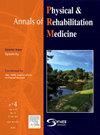诉讼对创伤后预后的影响:一项系统综述。
IF 4.6
3区 医学
Q1 REHABILITATION
Annals of Physical and Rehabilitation Medicine
Pub Date : 2025-08-05
DOI:10.1016/j.rehab.2025.102004
引用次数: 0
摘要
背景:人们普遍认为诉讼程序可能与结果有负相关。目的:本系统综述旨在比较创伤后接受赔偿程序的人与未接受赔偿程序的人之间的结果。这是第一次系统地回顾这一主题,包括所有类型的创伤。方法:采用PRISMA方法评估人身伤害(不包括医疗事故)后赔偿程序与结果之间的关系,包括1980年1月1日至2023年9月1日期间发表的英文文章,使用PubMed和Medline数据库。我们根据结果测量方法检索数据,并将数据分为5类:总体残疾和生活质量、认知、心理、躯体和社会。结果分为三类:薪酬程序与结果之间存在显著负相关关系的、不存在显著趋势的和薪酬程序与结果之间不存在显著差异的。采用不同设计研究质量评估工具(QATSDD)量表对研究质量进行评估。结果:从最初筛选的467篇文章中,27篇符合纳入标准(共5,668名受试者)。15篇文章发现诉讼与结果呈负相关,8篇文章发现无显著影响,其中2篇文章提示无显著趋势。根据结果测量,四篇文章有不同的结果。结论:虽然我们期望更强的结果支持补偿程序和结果之间的负相关,尽管由于方法学的异质性和缺乏有效证据的限制,我们仍然发现心理、身体、残疾和生活质量测量的结果趋向于较差。这些结果表明,在诉讼案件中,考虑潜在的次要利益的无意识和有意识机制具有临床意义。本文章由计算机程序翻译,如有差异,请以英文原文为准。
Effects of litigation on outcome after traumatic injury: A systematic review
Background
There is a widespread belief that litigation procedures may have a negative association with outcome.
Objectives
This systematic review aims to compare outcomes between people going through compensation procedures following traumatic injury vs those who are not going through compensation procedures following traumatic injury. This is the first systematic review on the subject that includes all types of trauma.
Methods
A PRISMA methodology was used to assess the association between compensation procedures and outcome following personal injury (excluding medical accidents), including articles published in English between 1st January 1980 and 1st September 2023, using the PubMed and Medline databases. We retrieved the data according to outcome measures and divided the data into 5 categories: overall disability and quality of life, cognitive, psychological, somatic, and social. The results were classified into 3 categories: those that showed a significant negative association between compensation procedures and outcome, those that showed a non-significant trend, and those that did not show a significant difference between compensation procedures and outcome. The quality of the studies was assessed using the Quality Assessment Tool for Studies with Diverse Designs (QATSDD) scale.
Results
From 467 articles initially screened, 27 met the inclusion criteria (total of 5,668 participants). Fifteen articles found a negative association between litigation and outcome, 8 found no significant effect, including 2 suggesting a non-significant trend. Four articles had different results according to the outcome measure.
Conclusion
While we expected stronger results in favor of the negative association between compensation procedures and outcome, and despite limitations due to methodological heterogeneity and the lack of valid evidence, we nevertheless found a trend towards poorer outcome on psychological, somatic, disability, and quality of life measures. These results suggest that there is a clinical relevance to considering the unconscious and conscious mechanisms of potential secondary benefits in cases of litigation.
求助全文
通过发布文献求助,成功后即可免费获取论文全文。
去求助
来源期刊

Annals of Physical and Rehabilitation Medicine
Medicine-Rehabilitation
CiteScore
7.80
自引率
4.30%
发文量
136
审稿时长
34 days
期刊介绍:
Annals of Physical and Rehabilitation Medicine covers all areas of Rehabilitation and Physical Medicine; such as: methods of evaluation of motor, sensory, cognitive and visceral impairments; acute and chronic musculoskeletal disorders and pain; disabilities in adult and children ; processes of rehabilitation in orthopaedic, rhumatological, neurological, cardiovascular, pulmonary and urological diseases.
 求助内容:
求助内容: 应助结果提醒方式:
应助结果提醒方式:


